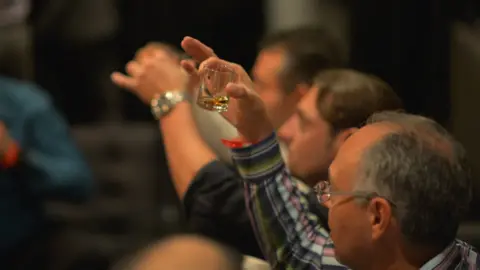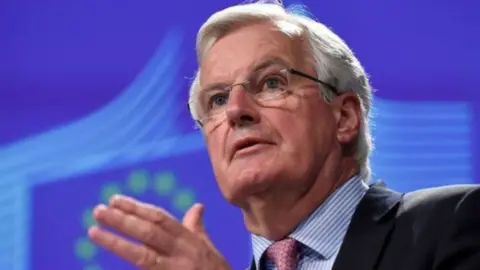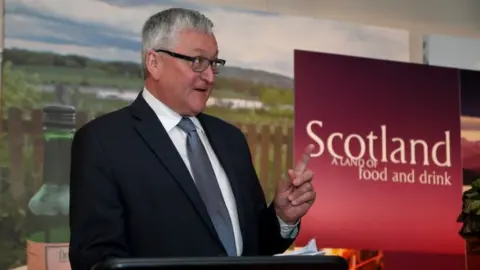Concerns over post-Brexit protections for Scotch whisky
 Getty Images
Getty ImagesThe EU's chief Brexit negotiator has voiced concerns about protection for goods like Scotch whisky after Brexit.
Writing in a newspaper, Michel Barnier said the issue was one of several that are holding up a deal with the UK.
The protections, known as "geographical indications", stop products being copied by firms outside the area where they are traditionally made.
UK ministers want to set up their own scheme that will provide "continuous protection for UK GIs in the UK".
But the Scottish government said the lack of a deal was "alarming", and suggested that standards may be watered down to help secure a trade deal with the US.
The UK is due to leave the EU in March 2019, via a transition period where issues like a new trade deal are to be hammered out.
A number of issues remain unresolved, with the lack of a deal to avoid a hard border between the UK and Ireland one of the most prominent issues.
However Mr Barnier has made clear in a newspaper article that Ireland is just one of several unresolved issues.
These include the status of Gibraltar and UK bases in Cyprus, and the special legal protection afforded to products like Scotch whisky and Parmesan cheese.
 AFP
AFPOnly whisky produced in Scotland can be called Scotch, and even the use of the name "Glen" on a German bottle recently resulted in legal action.
Dozens of products from the UK are currently protected in this way across the EU market, including Scotch lamb and beef, Scottish wild salmon and Stornoway black pudding.
The UK wants to set up its own scheme after Brexit, which it says will provide "continuous protection" for UK GIs domestically. According to the recent White Paper it will also be open to new applications from both inside and outside the country.
There is no mention of what protection the UK will provide for products like champagne, Parma ham or feta cheese.
'Important points'
Keeping the existing arrangements might limit the scope of any future trade deal between the UK and the United States, where there is powerful opposition to European GIs.
Not keeping existing arrangements might lead some in the EU to question their level of ongoing protection for iconic UK products from Arbroath smokies to Cornish pasties.
"We still need to agree on important points, such as the protection of 'geographical indications'," Mr Barnier wrote in his newspaper article.
"This refers to the protection of local farm and food products like Scottish whisky or Parmesan cheese, where EU protection has generated significant value for European farmers and producers."
 Scottish government
Scottish governmentScottish Rural Affairs Secretary Fergus Ewing said the lack of agreement on this issue was "alarming".
He said: "The UK government must make it clear it is not preparing to ditch vital geographical indications to facilitate a future trade deal with the US.
"It must rule out No Deal and reach an agreement that protects our world-class produce."
In a statement, the UK government said "negotiations on geographical indications (GIs) are continuing".
They added: "GIs are very important to the UK, both culturally and economically, and that is why we will establish specific GI schemes to protect UK GIs in the future.
"This means favourites such as Scotch whisky, Scotch beef and lamb, Scottish wild salmon - and all other current UK GI protected products will continue to be safeguarded in the UK when we leave the EU."
The Scotch Whisky Association said there was no reason to believe Scotch would not also continue to enjoy GI protection in the EU after Brexit.
But a spokesperson for the Association said the would "urge the government to ensure the automatic protection of EU GIs in the UK" from the day its new scheme takes effect.
In addition to EU protection for whisky, it also benefits from GI rules enforced by the World Trade Organisation in most countries around the globe.
